Global Lens Reflections on life, the universe, and everything
War against the poor in the Philippines
United Methodist deaconesses accompany families impacted by “war on drugs”
Published in response magazine in 2019
By Paul Jeffrey
When the police arrived at the tangle of small shacks that compose Kimberly Jugadora’s neighborhood in Manila, they were all wearing masks. Her father and brother were working on a motorcycle in the small street in front of their home when the heavily-armed men ordered them to lay face down. Her mother went outside to see what was happening. Soon the police placed both her mother and father on the backs of motorcycles and drove off. Jugadora ran after them, but wasn’t able to keep up. She could only watch in horror as they disappeared into the chaos of the Philippine capital.
Over the next several hours, Jugadora repeatedly called her mother’s cell phone with no result. She went to several police stations but everyone she talked with claimed they knew nothing. Finally she got word that her mother’s body had been spotted under a nearby bridge and her father’s body had been dumped in the cemetery. Before she could get there herself, the bodies had been transported to a local funeral home. Jugadora and her siblings spent several days coming up with the money to retrieve the bodies so they could properly mourn and bury the couple.
Jugadora today keeps a photo of her parents–Rogelio Buena and Jenny Royo–on a small altar in their simple home. Her 6-year old daughter, Clarisa, will go to the altar when she misses her grandparents and place her fingertips on their photo. When she comes home from school, Clarisa will talk to the photo, telling her grandparents about her day, asking them about theirs. Jugadora says Clarisa worries about whether they have enough food in heaven. “I assure her that God is taking good care of them. She asks me when they’re coming back. I tell her they aren’t, but that we will one day go to be with them. If I didn’t believe that, I would go crazy,” she said.
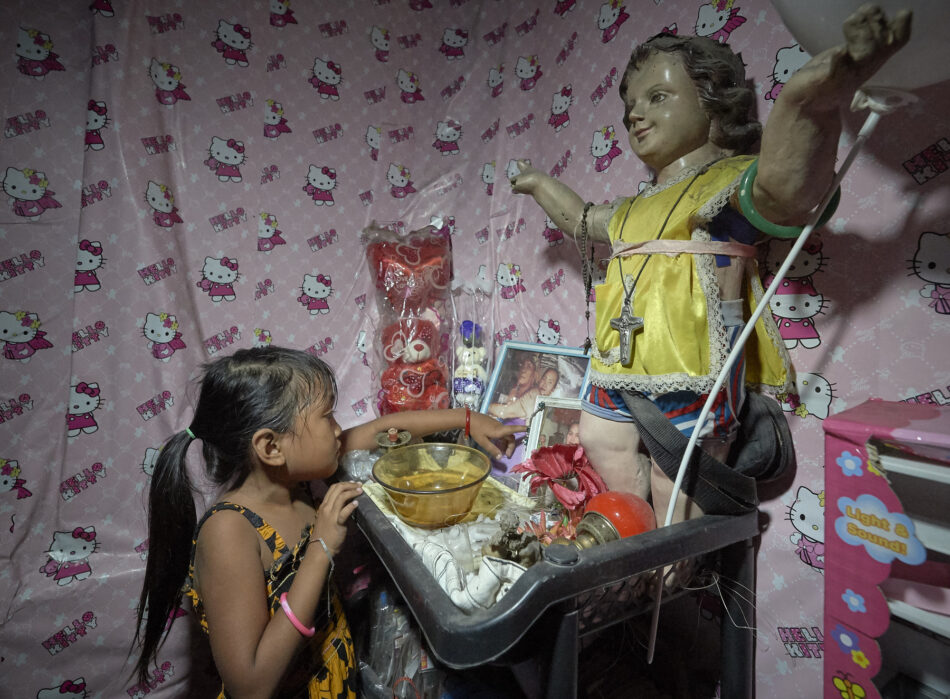
Clarisa’s grandparents were murdered in 2017, just two of many victims in the so-called war on drugs championed by Philippines President Rodrigo Duterte. When he took office in 2016, Duterte promised an all-out war on drugs, principally shabu, the local version of methamphetamine, the use of which has reached epidemic proportions, particularly in poor neighborhoods where many are forced to work long hours, including at night, in factories, construction sites and call centers. Shabu, often mixed with caffeine in pills, keeps people awake and functioning.
The meth crisis isn’t unique to the Philippines. A July report from the United Nations found the methamphetamine trade is now worth between $30 billion and $61 billion per year in East and Southeast Asia, Australia, New Zealand and Bangladesh. That’s up from $15 billion per year in 2010. Much of the meth is produced in lawless areas of Myanmar, then traffickers take advantage of upgraded highways and other transportation infrastructure throughout the region to deliver their product. They’ve achieved such economy of scale that the street price has dropped to a record low, while at the same time producers reap record profits.
While all affected nations wrestle with how to respond, the savagery of the Philippines response–rights groups believe the death toll tops 23,000 people–has set the island nation apart. Branding drug users as subhuman creatures worthy of extermination, Duterte turned the country’s police loose on them, provoking a systematic campaign of extrajudicial killings in which hit men on motorcycles, their faces always covered, became the instrument of choice. Yet it was a blunt instrument, and the dead were often not drug pushers or even drug users, but rather someone standing on the wrong street corner at the wrong time.
“The men with masks come through here frequently. We don’t know who they are, but they’re usually looking for someone. I don’t know where they get the names on their lists. But it doesn’t matter much. Whether your name is on the list or not, once they enter your house they can simply kill you,” said Jugadora.
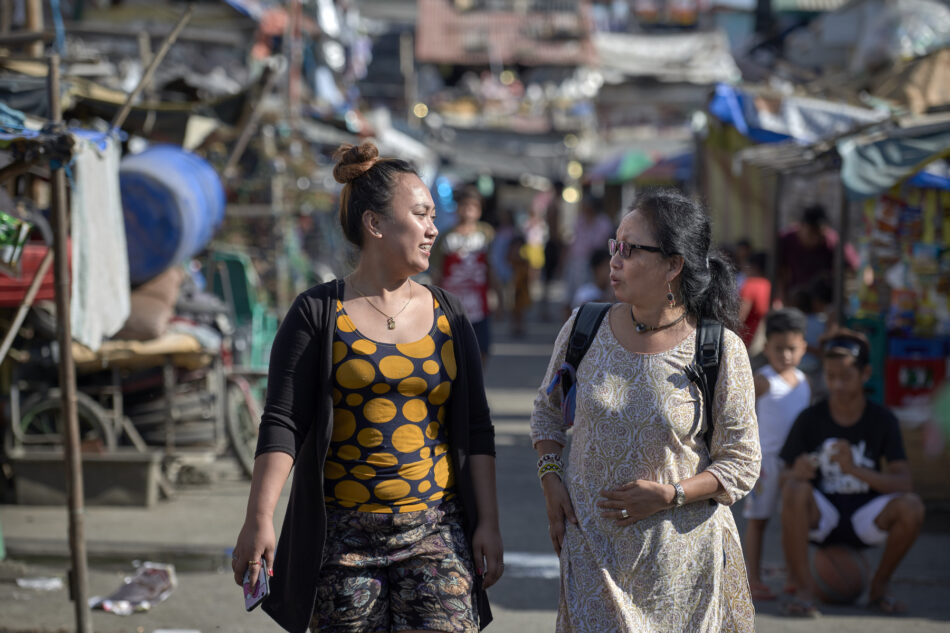
She suggests the government campaign is really a war against the poor. “Why have no rich people been killed? The only people they kill live in squatter settlements like where I live. It’s because the poor can’t fight back. The poor can’t pursue a case in the courts. But rich people can, so they leave the rich alone,” she said.
Critics of the government campaign claim it’s counterproductive.
“There is no war against illegal drugs. Because the supply is not being stopped. If they are really after illegal drugs they would go after the big people, the manufacturers, the smugglers, the suppliers. But instead they go after the victims of those people,” said Catholic Bishop Pablo Virgilio David, whose diocese includes Jugadora’s neighborhood. “This war on illegal drugs is illegal, immoral, and anti-poor.”
Many rights activists suggest Duterte’s drug war serves as cover for an attempt to consolidate power and silence his political opponents. Indeed, several opposition mayors and other local officials have been denounced as drug traffickers by Duterte, only to die in a hail of police bullets soon after.
“Everyone was afraid”
From the beginnings of the drug war killings, church leaders and pastoral workers searched for how to respond. Public criticism was muted, in part because Duterte quickly fired back at anyone who spoke out against the assassinations. He called Bishop David a “son of a bitch” and accused him of peddling drugs and stealing church funds.
United Methodist Deaconess Norma Dollaga was one of several church activists who began to organize prayer vigils and memorial services for the dead. But she said there was resistance, even in the churches, because of widespread initial support for the president’s policies.
“People would tell us that it was good that the addicts were being killed. We responded by saying we didn’t oppose efforts to stop the use of illegal drugs. We were against killing people,” she said.
Early efforts to get family members of the victims to protest were unsuccessful. “Everyone was afraid, and no one wanted to speak out,” Dollaga said. “They were all afraid that the same will happen to them.”
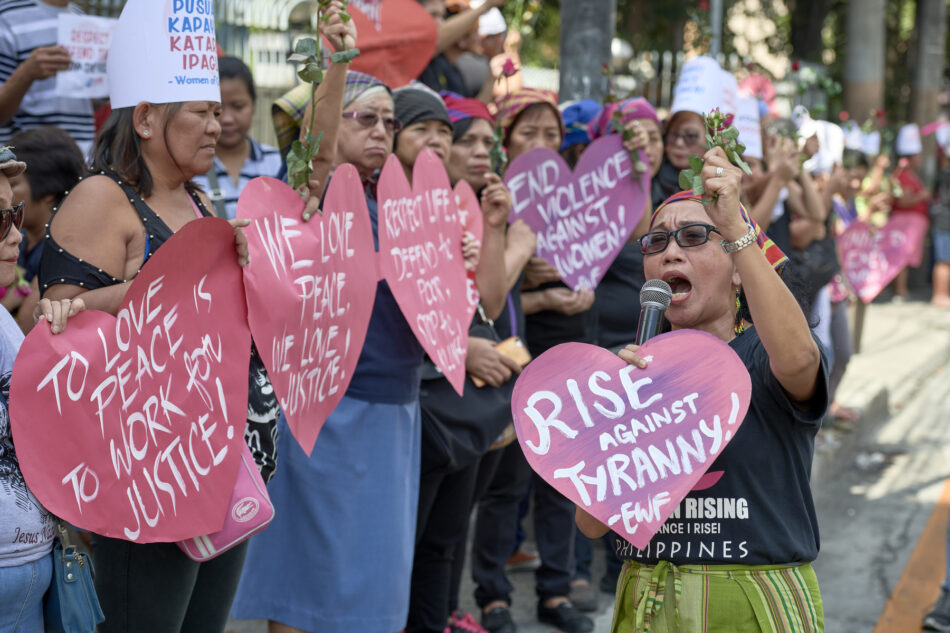
Working with a coalition of church activists and volunteer lawyers, Dollaga and Deaconess Rubylin Litao formed Rise Up for Life and for Rights. As the bodies piled up, they started documenting the violence and providing economic and psychosocial support for victims’ families.
On December 28, 2016, a masked man got off a motorcycle and started shooting up a party in Bagong Silang, a poor neighborhood on the outskirts of Manila. By the time he finished shooting, seven people were dead–including a pregnant woman. Because December 28 is known to Catholics as the Day of the Holy Innocents, which commemorates the slaughter of children during Herod’s attempt to kill the infant Jesus, what became known as the Bagong Silang Massacre took on special meaning in the Philippines, where Bagong Silang means “newborn.”
Dollaga and other Rise Up members went to Bagong Silang early the next morning.
“No one wanted to talk to us at first. Finally we met a woman, the mother of one of the dead. She asked us why we were there, and we said, ‘We are from the church.’ So she started to cry and poured out her testimony to us about all that had happened. We listened and then asked if we could pray with her, and she accepted. We asked God to release her from pain. The next day we came back, and, besides coming to listen and pray, we brought flowers. We then asked if we could hold an ecumenical service for them, and they said yes, so we called friends from the Catholic Church and several Protestant denominations and got that organized. But then people got worried because they had no money to pay us. The tradition is that families pay the priest or pastor for this. We said it was free. So we had the service, and kept coming back over the following days. One woman, who was wrestling with hard questions about why her son had died, told me that while she was accustomed to going to the church to pray and seek God’s guidance, she had never had the church come to her. It was the beginning of many evenings with the mothers, listening to them, holding them as they cried, consoling them,” said Dollaga.
Rise Up also brought in an acupuncturist to help the survivors with health issues, and began organizing what became regular summer camps for children of affected families.
The group also offered sanctuary to a young man who survived the massacre. Ryan Acuna was injured in the shooting, and his family feared the killers would return to finish him off. So Rise Up took Acuna (not his real name) to a Catholic convent, where he spent several weeks in hiding. He then lived with the local Catholic priest, who offered sanctuary to several young people at risk of assassination.
It was there that Acuna met Antonio Soto, a young man who had turned himself in to the police in his neighborhood as a way to seek protection from hit squads. Called “surrenderees,” these were people who had used shabu in the past, but had stopped.
Soto (not his real name) says he first used shabu at age 15. “It made me feel strong and intelligent. Like I could do anything. But it wasn’t good for my body, so I stopped using it. My older brother died of using it, and I have another brother who is currently using and selling, and I worry he’ll either die from the drug or from the police,” he said.
Soto and six of his friends, three of whom lived with him in the church, checked in with the police every Monday. In exchange, they were placed on a “cleared” list, which supposedly guaranteed they wouldn’t be killed.
Yet when the other six surrenderees in his neighborhood were killed one by one over the course of a month, Soto abandoned the church. “By having me report to the police every week, they were just familiarizing themselves with me, studying me, as the better they get to know me the easier it was for them to kill me,” he said.
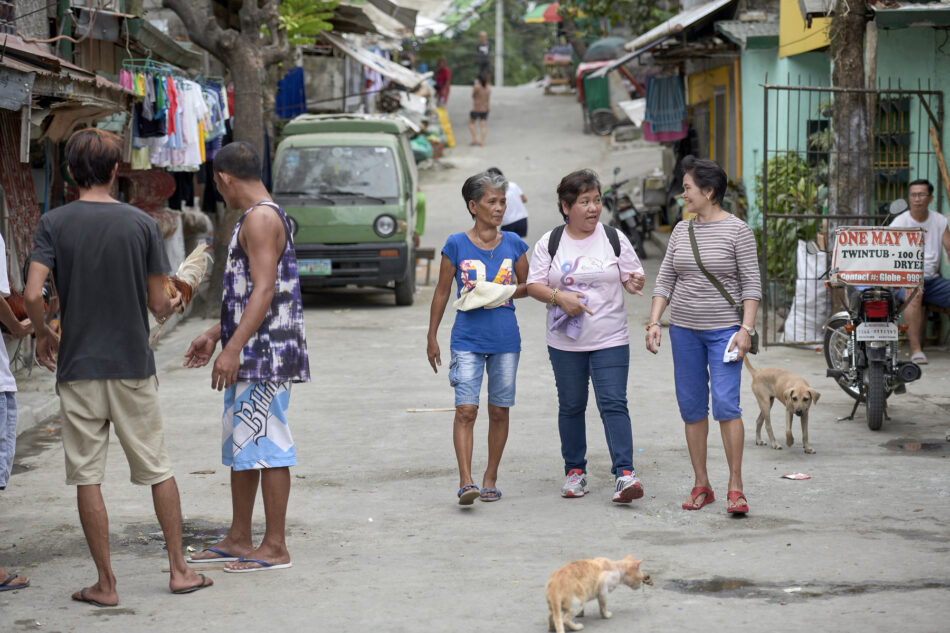
Soto fled to the countryside and lived with relatives for several months. But he missed his family and friends, so eventually moved back to Manila. Rise Up arranged for him and Acuna to live in a Protestant church. During the days, they often help pack coffee that Rise Up sells. Organically grown by indigenous communities, proceeds from sales benefit families of drug war victims.
“I want to help other women fight for justice”
For deaconesses like Dollaga and Litao, the work of Rise Up is central to what it means to be a deaconess.
“Part of our calling is to alleviate suffering and to help develop human potential,” said Litao. “We truly believe that people can rise up, that people can speak out about their situation. We are just here to facilitate, to be with them and encourage them to tell their stories. It’s part of the larger movement towards justice and peace.”
Dollaga compares the camps they conduct for children of families affected by the violence with Sunday School classes, what many in the Philippines consider the traditional domain of deaconesses.
“The only difference is that Sunday School is more for the privileged, for churchgoers, while in the camps we are sharing hope and joy with children of very poor families. For me, this is at the heart of the ministry of a deaconess,” Dollaga said.
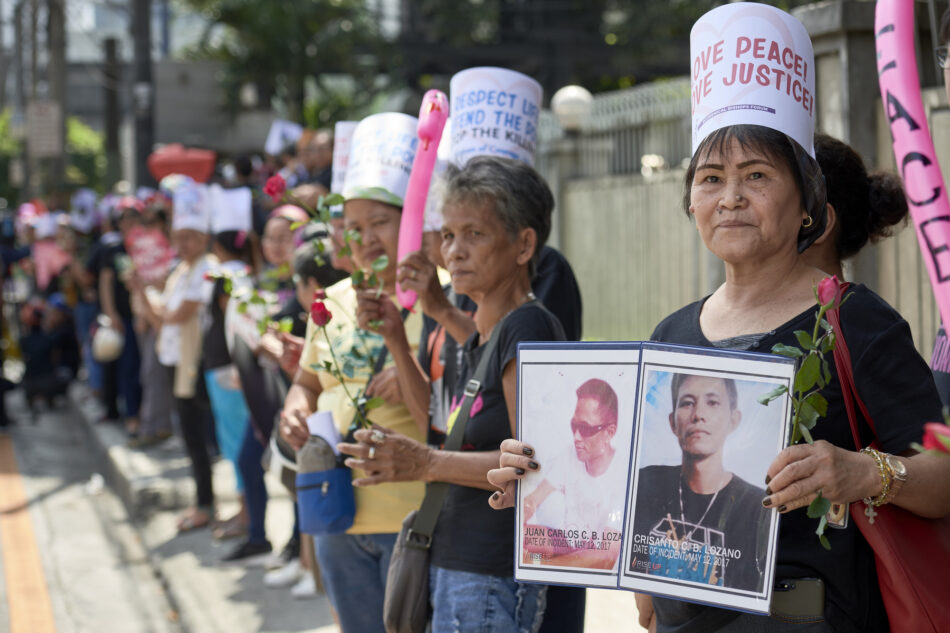
Rise Up depends on a network of volunteers to reach out to the rapidly expanding number of families affected by Duterte’s campaign. One of them is Normita Lopez, who volunteers for very personal reasons.
“My son was killed by a policeman. He was surrendering, but they shot him five times until he was dead. That’s why I came to Rise Up to be a volunteer. I want to help other women fight for justice for their loved ones,” Lopez said.
Her son Djastin was 25 years old when he was killed in May 2017.
“He was a drug addict. But he was surrendering when they killed him. He raised his hands. Why did they shoot him? Normally, they handcuff them and put them into jail so that we can see him every day and talk to him. But now we can never visit him or talk with him,” she said. “This is not a war against drugs. This is a war against the poor. Because in the Philippines if you are a rich drug addict you will never get killed. At worst they might put you in jail. If you are wealthy, they release you. If you are poor, they kill you.”
Evelyn Jose, a Catholic nun who works with Rise Up, says Duterte’s war on drugs is a form of social cleansing.
“The people being killed are the poor. They are drivers or scavengers, people who live in the slums, the poorest areas at the periphery of the city, and need to stay awake long hours. They think shabu helps them do that. They are addicts, not criminals. They are victims. They are sick people. And they are killed because some powerful people want to eliminate the poor,” said Sister Jose.
“But for us in the church, for those who respect life, there is hope for these persons. If they can be given the proper assistance, if they are given a chance to be a new person, there’s hope. You can see that in the rehabilitation centers. Yet many have graduated and returned to their communities only to get killed because they are still on someone’s list. No allowance is made by the killers for someone who has been rehabilitated or healed. They don’t consider that. They just see them as a problem. They see them as an eyesore in society, people who don’t have a place. So they eliminate them.”
Sikini Labastilla is a lawyer who heads the anti-drug office of the city of Kalookan at the edge of Manila. He has worked with churches in the city to set up community-based rehabilitation centers that treat not just the addict, but also address family issues and work to reintegrate the addict back into society with a job and a support network. He says churches play a critical role in challenging the dominant narrative encouraged by those who sponsor the violence. He points out that when one Catholic priest in the city publicly decried the murder spree, the killings in his parish dropped dramatically.
“We need to take away the God aspect from those who sponsor this,” he said. “If you have a gun and you’re going to kill these people because you believe they are not human, you become a destroyer. You think you are God, with the power to end their life.”
But Labastilla seeks out police officials and reminds them they aren’t God.
“We meet regularly with the police, and we tell them they just can’t kill everyone. No matter what their boss wants them to do,” he said.
No mercy
In August 2018, Rise Up took another step in its support of victims’ families. Along with six relatives of murdered individuals, it filed a case before the International Criminal Court, accusing Duterte of crimes against humanity.
Normita Lopez is one of the plaintiffs. Another is Irma Locasia, whose son Salvador was killed by police in 2016.
She says Salvador was attending the wake of a neighbor when police officers showed up. They pushed the women into a building and ordered all the men, who’d been gambling outside, a common practice at all-night wakes, to lay face down in the street. The police pocketed the gambling money, then dragged Salvador into a nearby alley.
Witnesses saw and heard what happened next.
“My son was begging. ‘Please spare me. Put me in jail, please, but don’t kill me.’ But the police told him they had no mercy, and they shot him four times,” Locasia said.
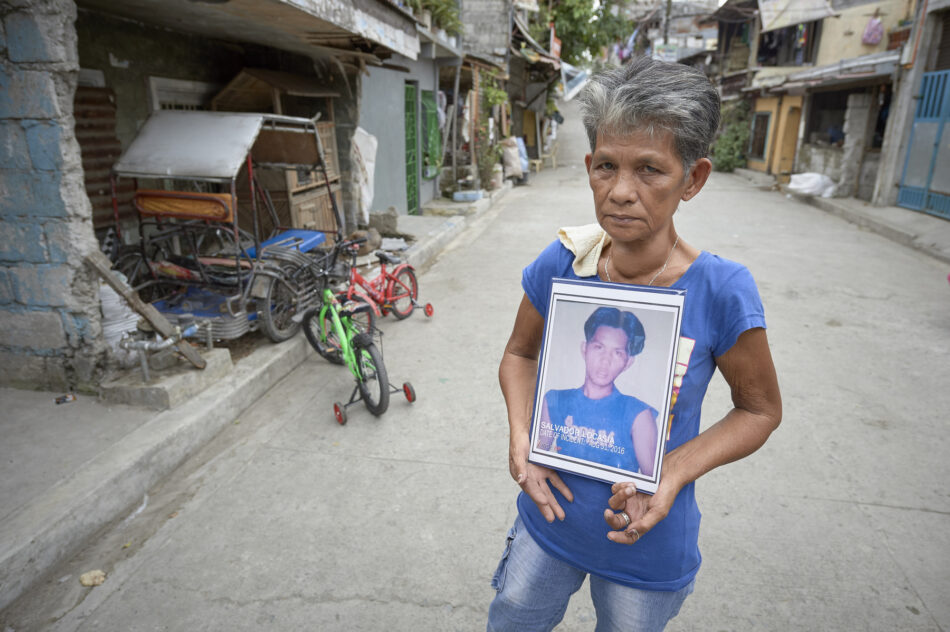
According to one witness, one of the policemen then took an envelope from under his arm, took out shabu, some money, and a gun, and placed them around his body. They then took pictures of the scene, before taking away Salvador’s body.
For Locasia to recover her son’s body, she first had to come up with 35,000 pesos (about $700). The local priest helped her raise the funds, and she was able to bring Salvador’s body home after two days and begin the process of mourning and burial.
Locasia, who works as a street sweeper, says she doesn’t know if her son used drugs or not. But she says that at the urging of local officials he turned himself into municipal officials who photographed him and sent him home with assurances he’d be safe. A week later he was killed.
“If he was using drugs, he deserved to be treated, not killed,” she said.
Once Salvador was buried, Locasia says she went to the local police station and asked who killed her son. “They said that if he was an addict, then he had to die. That’s all they would tell me,” she said.
“I didn’t protest then, but as I got to know people in Rise Up over the months afterwards, and learned more about why people were being murdered, I decided to join with the others to stop the killings. I don’t want other mothers to go through what I’ve experienced. Duterte gave the command for these killings, and they need to stop.”
Locasia credits Rise Up with helping her move from being a victim to being an advocate.
“Being with others who’ve lost their loved ones to the killers has helped me know I’m not alone. It has encouraged me to be more courageous and vocal in telling my story and demanding that things change,” she said.
Roselle Tullao, an organizer for Rise Up, says Locasia’s transformation is inspiring. And not uncommon.
“When Norma (Dollaga) and I go to a village where a killing has happened, people are usually afraid at first to talk about it. They’re scared. We’re afraid too, and we’re honest with them about that. But we believe that hope is more powerful than fear, because we’ve seen that happen as the mothers have decided to leave their fear behind and rise up,” Tullao said.
“When we started this, we would accompany the mothers as they went to file charges. They would always cover their faces, and we had to ask the media not to take their photos. But slowly they have lost their fear, uncovered their faces, and they are insisting that Duterte be held accountable. I am humbled by the power that these poor women possess, and thankful that they’ve shared it with us as we struggle together. The women are pushing their cases, and we are blessed by their persistence.”
In March, Duterte pulled the Philippines out of the International Criminal Court, an action that only Burundi, where President Pierre Nkurunziza faced similar accusations, had done before. Officials for the Court, which is based in the Netherlands, said the country’s withdrawal will not affect their investigation of the charges.
Paul Jeffrey is a photojournalist who lives in Oregon.